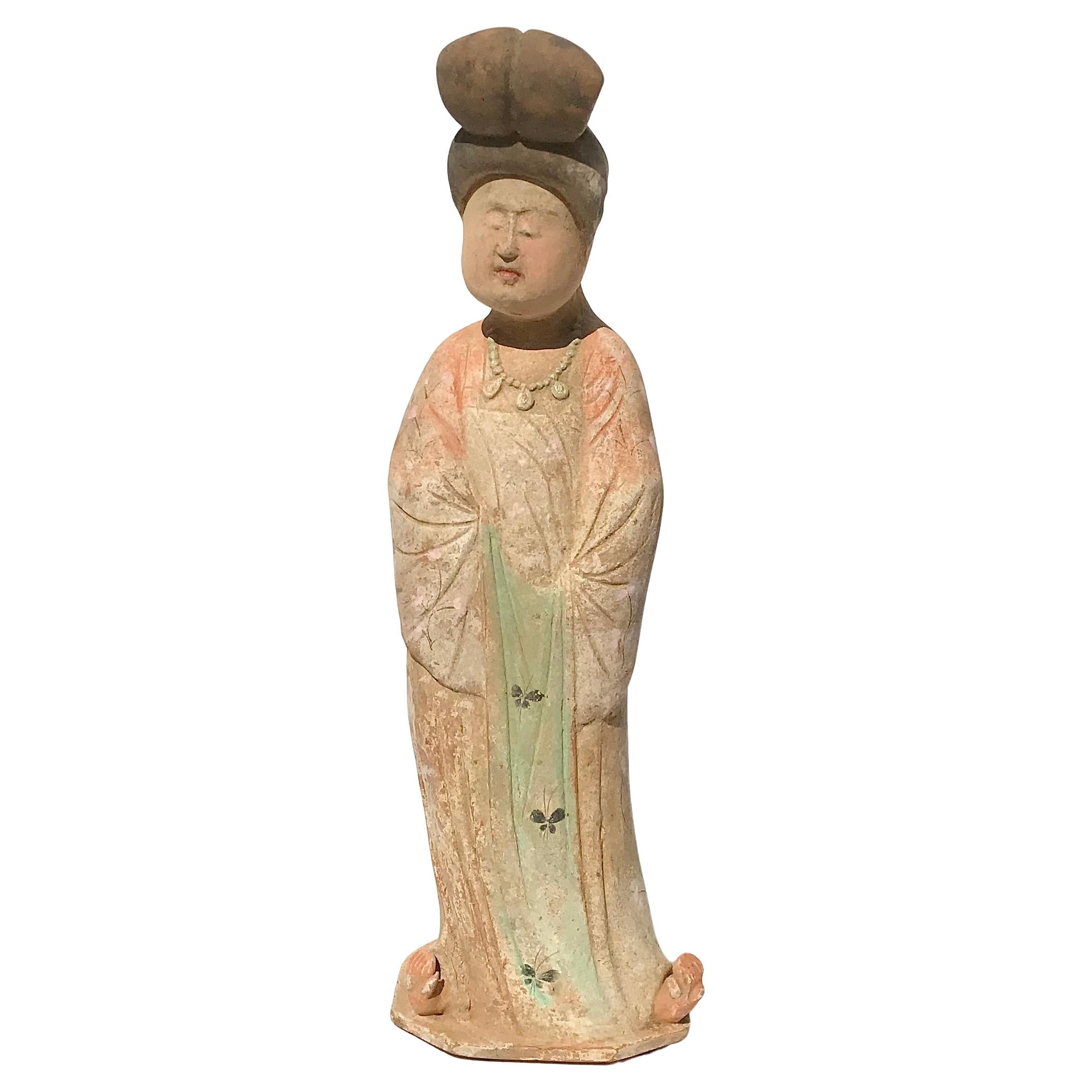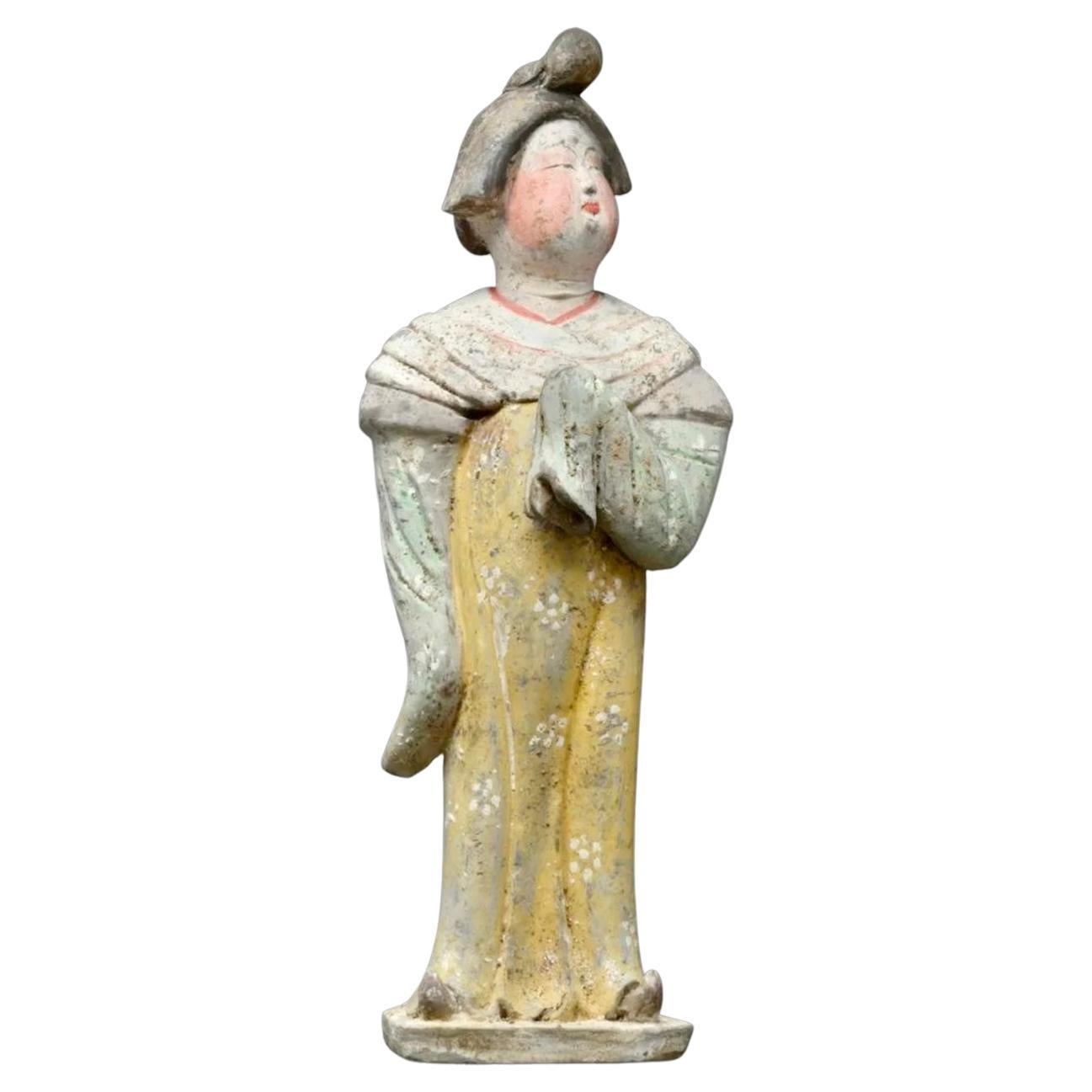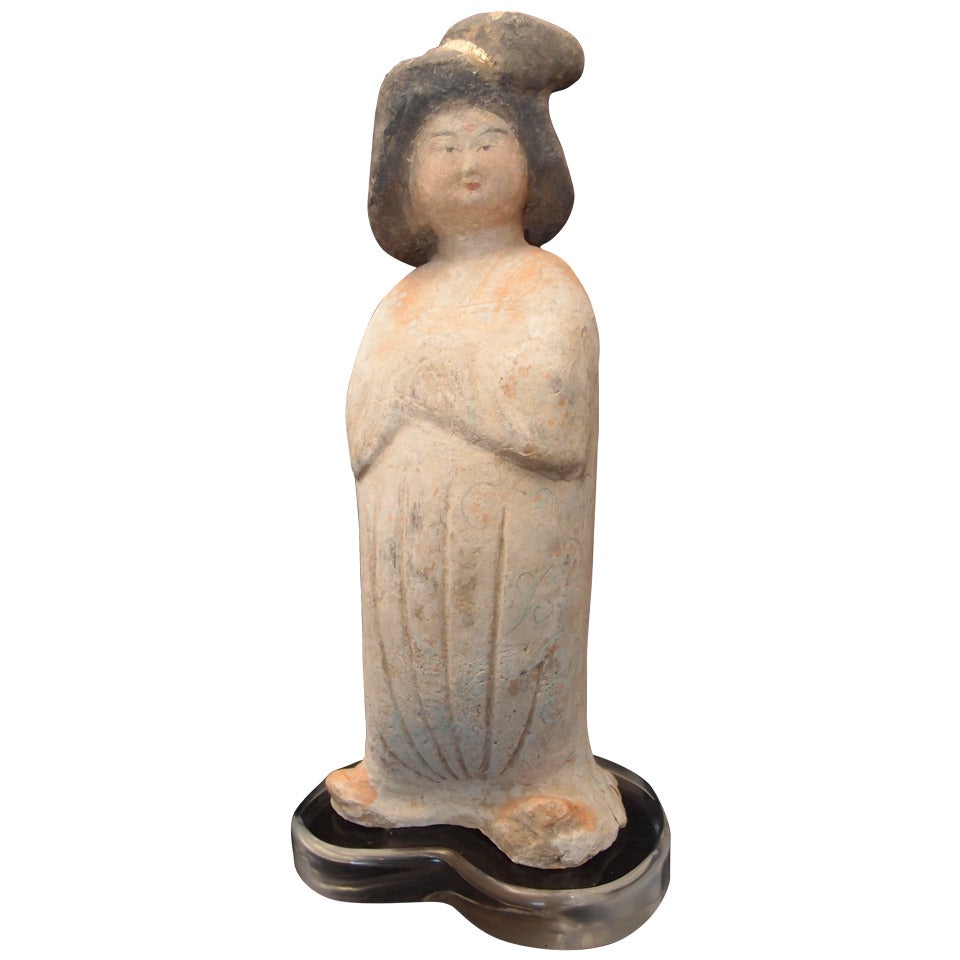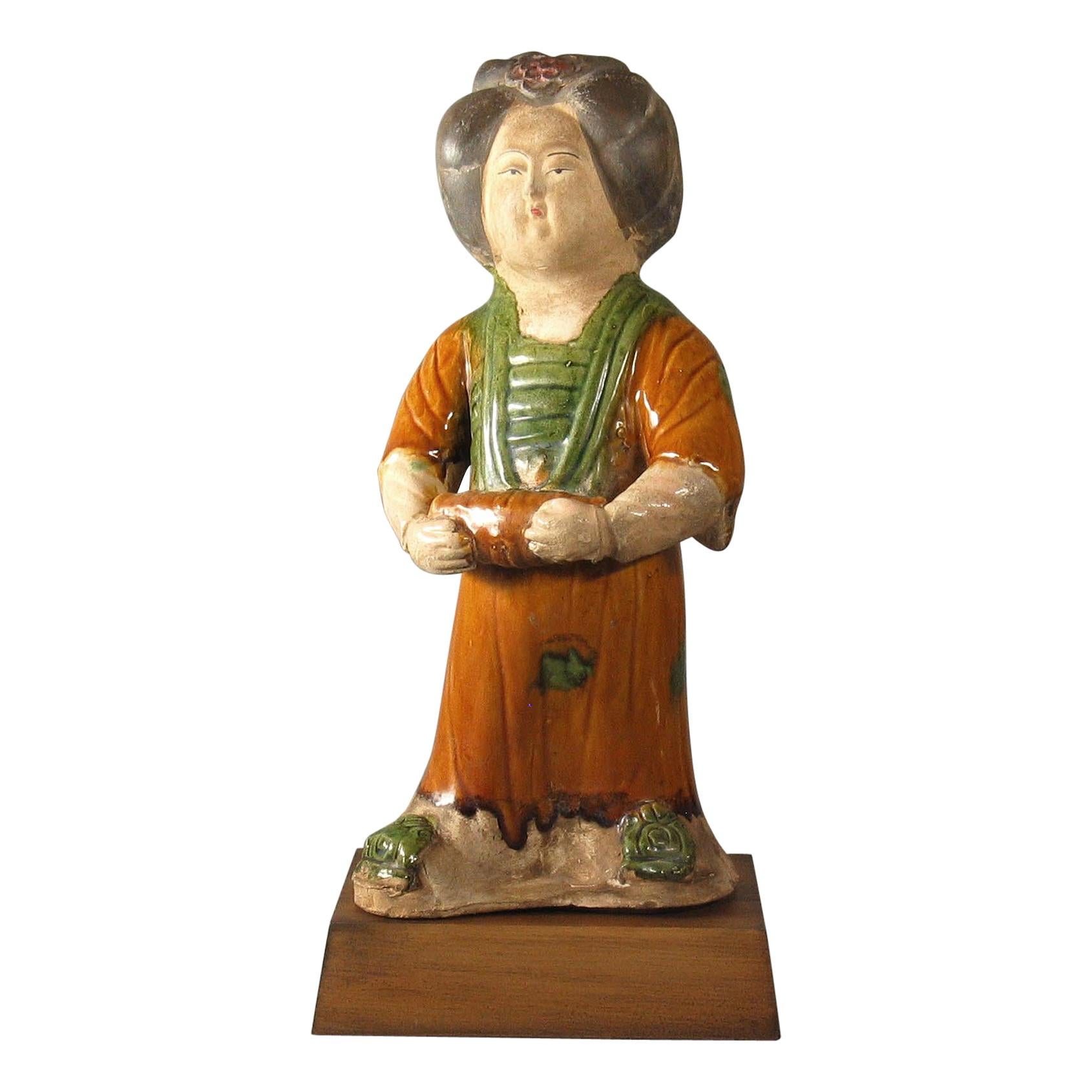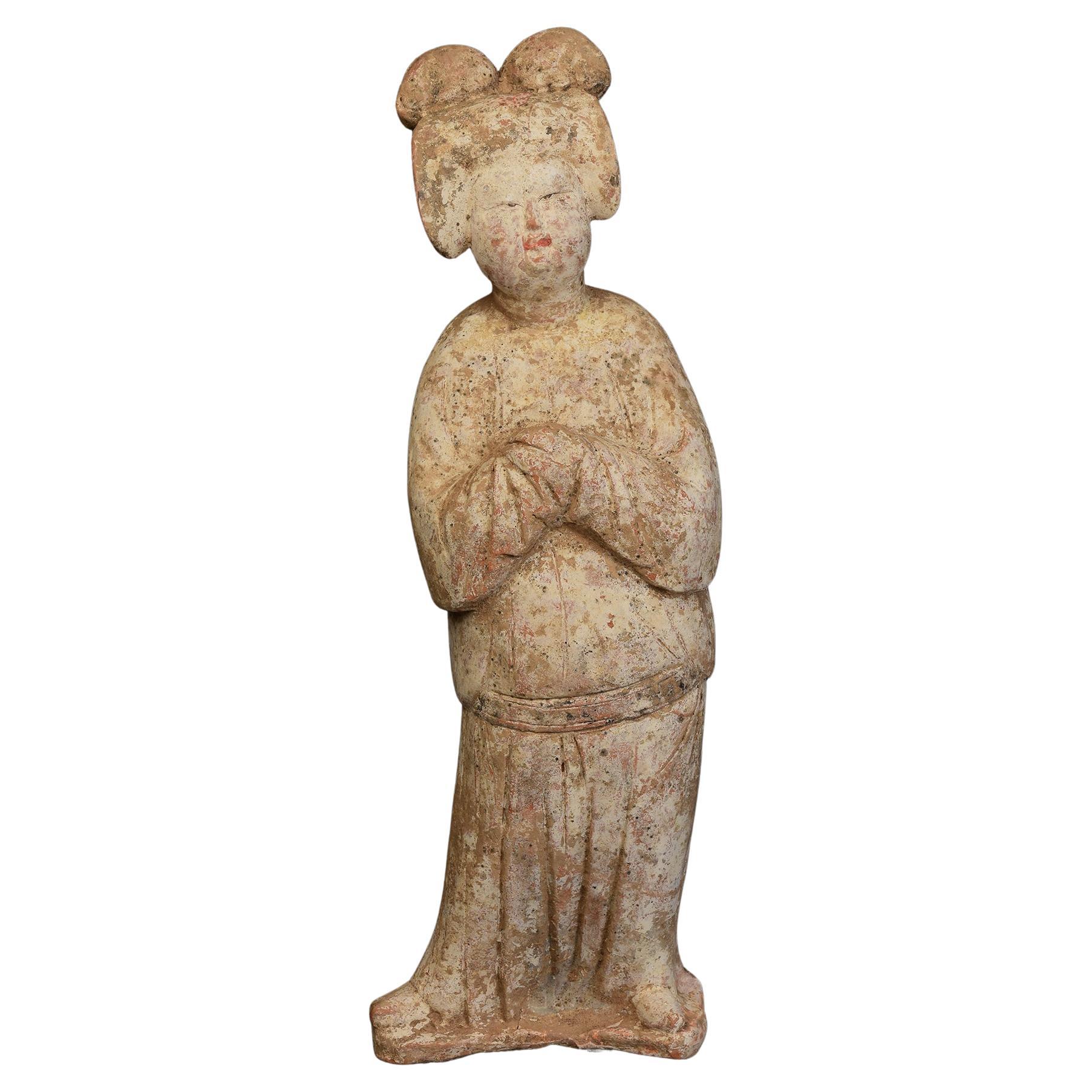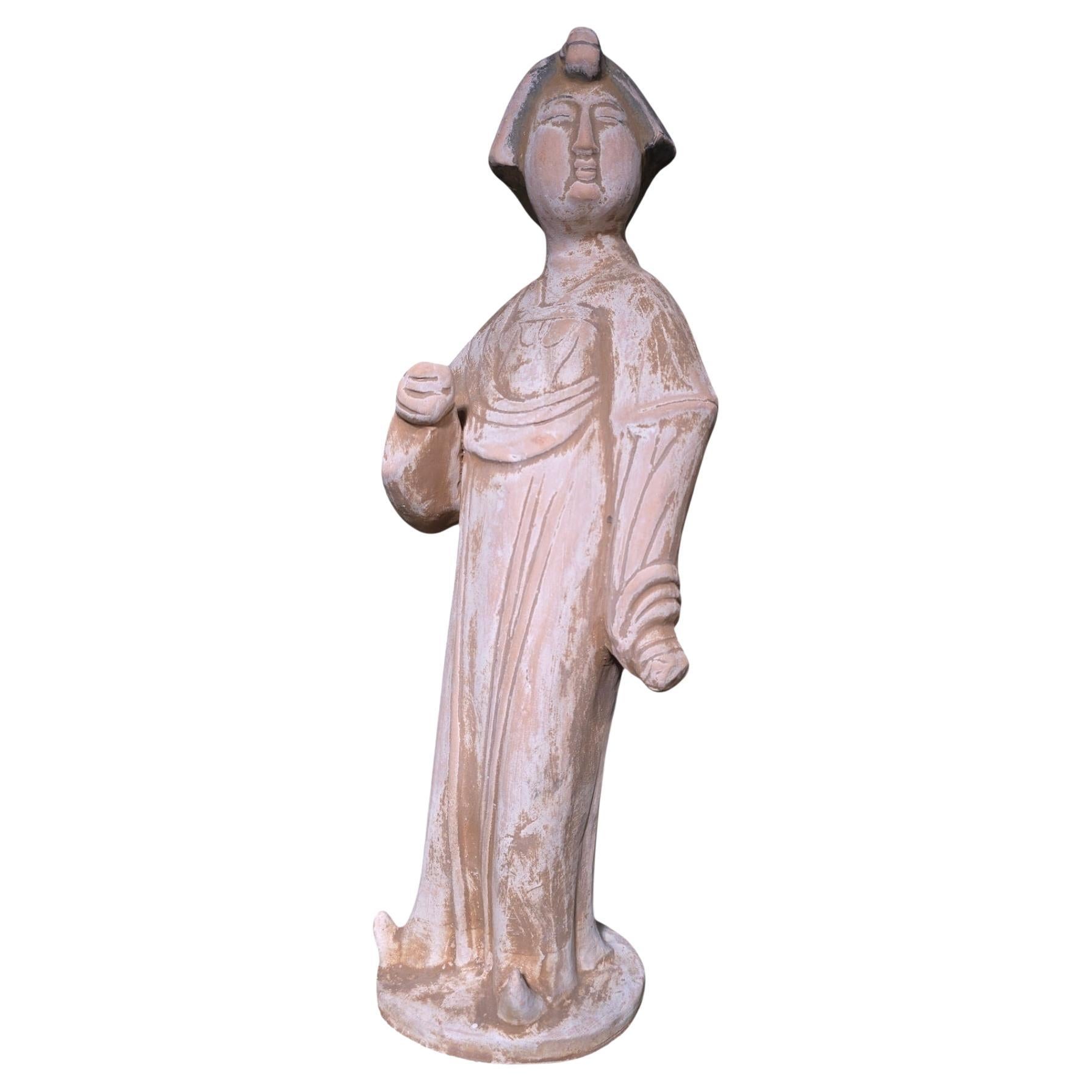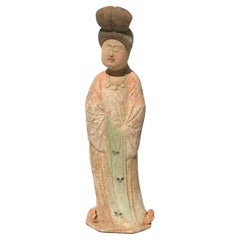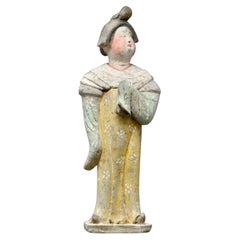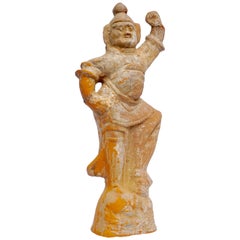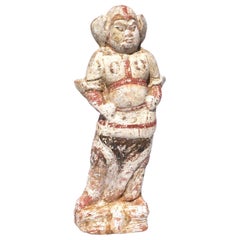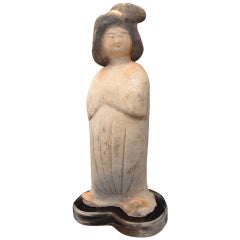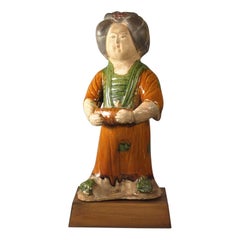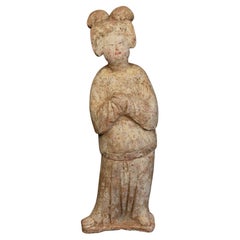Items Similar to Tang Dynasty Fat Lady Pottery Figure
Want more images or videos?
Request additional images or videos from the seller
1 of 10
Tang Dynasty Fat Lady Pottery Figure
$4,500
£3,396.03
€3,887.94
CA$6,346.49
A$6,967.66
CHF 3,635.04
MX$84,318.35
NOK 45,559.60
SEK 42,929.12
DKK 29,022.41
About the Item
Tang Dynasty Terracotta sculpture of a fat lady
This stunning lady wears her hair in an elaborately styled coiffure. A remarkable amount of the original pigment that once decorated this work remains intact. Such women may represent wives, princesses, or attendants. Their beauty inspires us as we are transported back to another time. This gorgeous sculpture has been to the next world and returned to our modern era to tell us her tale. She speaks of the enormous wealth and sophisticated culture of the T’ang Dynasty, one of the greatest periods of artistic creation in human history. Although she speaks of the past, this lady in waiting continues to amaze us in the present with her unmatched beauty and sculptural refinement
Measures: Height: 11.5 Inches. 12.3 Inches with included wood stand.
Condition: Repair to neck. Otherwise; Excellent
It was during the T’ang Dynasty that China’s outstanding technological and aesthetic achievements opened to external influences, resulting in the introduction of numerous new forms of self-expression, coupled with internal innovation and considerable social freedom. The T’ang dynasty also saw the birth of the printed novel, significant musical and theatrical heritage and many of China’s best-known painters and artists. The Dynasty was created on the 18th of June, 618 AD, when the Li family seized power from the last crumbling remnants of the preceding Sui Dynasty. This political and regal regime was long-lived, and lasted for almost 300 years. The imperial aspirations of the preceding periods and early T’ang leaders led to unprecedented wealth, resulting in considerable socioeconomic stability, the development of trade networks and vast urbanisation for China’s exploding population (estimated at around 50 million people in the 8th century AD). The T’ang rulers took cues from earlier periods, maintaining many of their administrative structures and systems intact. Even when dynastic and governmental institutions withdrew from management of the empire towards the end of the period – their authority undermined by localised rebellions and regional governors known as jiedushi –the systems were so well- established that they continued to operate regardless. The artworks created during this era are among China’s greatest cultural achievements. It was the greatest age for Chinese poetry and painting, and sculpture also developed (although there was a notable decline in Buddhist sculptures following repression of the faith by pro-Taoism administrations later in the regime). It is disarming to note that the eventual decline of imperial power, followed by the official end of the dynasty on the 4th of June 907, hardly affected the great artistic turnover. During the Tang Dynasty, restrictions were placed on the number of objects that could be included in tombs, an amount determined by an individual’s social rank. In spite of the limitations, a striking variety of tomb furnishings – known as mingqi – have been excavated. Entire retinues of ceramic figures – representing warriors, animals, entertainers, musicians, guardians and every other necessary category of assistant – were buried with the dead in order to provide for the afterlife. Warriors (lokapala) were put in place to defend the dead, while horses/camels were provided for transport, and officials to run his estate in the hereafter. Domestic servants and attendants were also included, however, and it is to this category that the current pieces belong. During the Tang Dynasty, restrictions were placed on the number of objects that could be included in tombs, an amount determined by an individual’s social rank. In spite of the limitations, a striking variety of tomb furnishings, known as mingqi, have been excavated. Entire retinues of ceramic figures – animals, entertainers, musicians, guardians – were buried with the dead in order to provide for the afterlife. Of the various types of mingqi, perhaps none are more charming than the beautiful sculptures of elegant female courtiers. These gorgeous sculptures represent the idealized woman of the T’ang Dynasty. This sophisticated lady provided eternal companionship for her lord throughout the afterlife. We can imagine her gracefully dancing or singing a poetical song, two very popular customs for courtiers during the T’ang Dynasty, considered a golden age of Chinese culture. Such ladies are described in the numerous love poems written during this era, the greatest outpouring of poetry in Chinese history.
AVANTIQUES is dedicated to providing an exclusive curated collection of Fine Arts, Paintings, Bronzes, Asian treasures, Art Glass and Antiques. Our inventory represents time-tested investment quality items with everlasting decorative beauty. We look forward to your business and appreciate any reasonable offers. All of our curated items are vetted and guaranteed authentic and as described. Avantiques only deals in original antiques and never reproductions. We stand behind our treasures with a full money back returns if the items are not as described.
Please also consider Avantique’s antique and ancient Asian Art Collection of Han Dynasty, Tang Dynasty, Ming Dynasty, Qing, and Republic period items to complete your home and office decorations with class. Avantiques has Asian pottery, terra cotta, bronze, and paintings to complement your collection. We strive to collect the highest quality Asian antiquities in exceptional condition.
- Dimensions:Height: 11.5 in (29.21 cm)Width: 4.5 in (11.43 cm)Depth: 3.74 in (9.5 cm)
- Style:Tang (Of the Period)
- Materials and Techniques:Pottery,Fired
- Place of Origin:
- Period:
- Date of Manufacture:650
- Condition:Repaired: Repair to neck. Wear consistent with age and use.
- Seller Location:Dallas, TX
- Reference Number:1stDibs: LU1774226826812
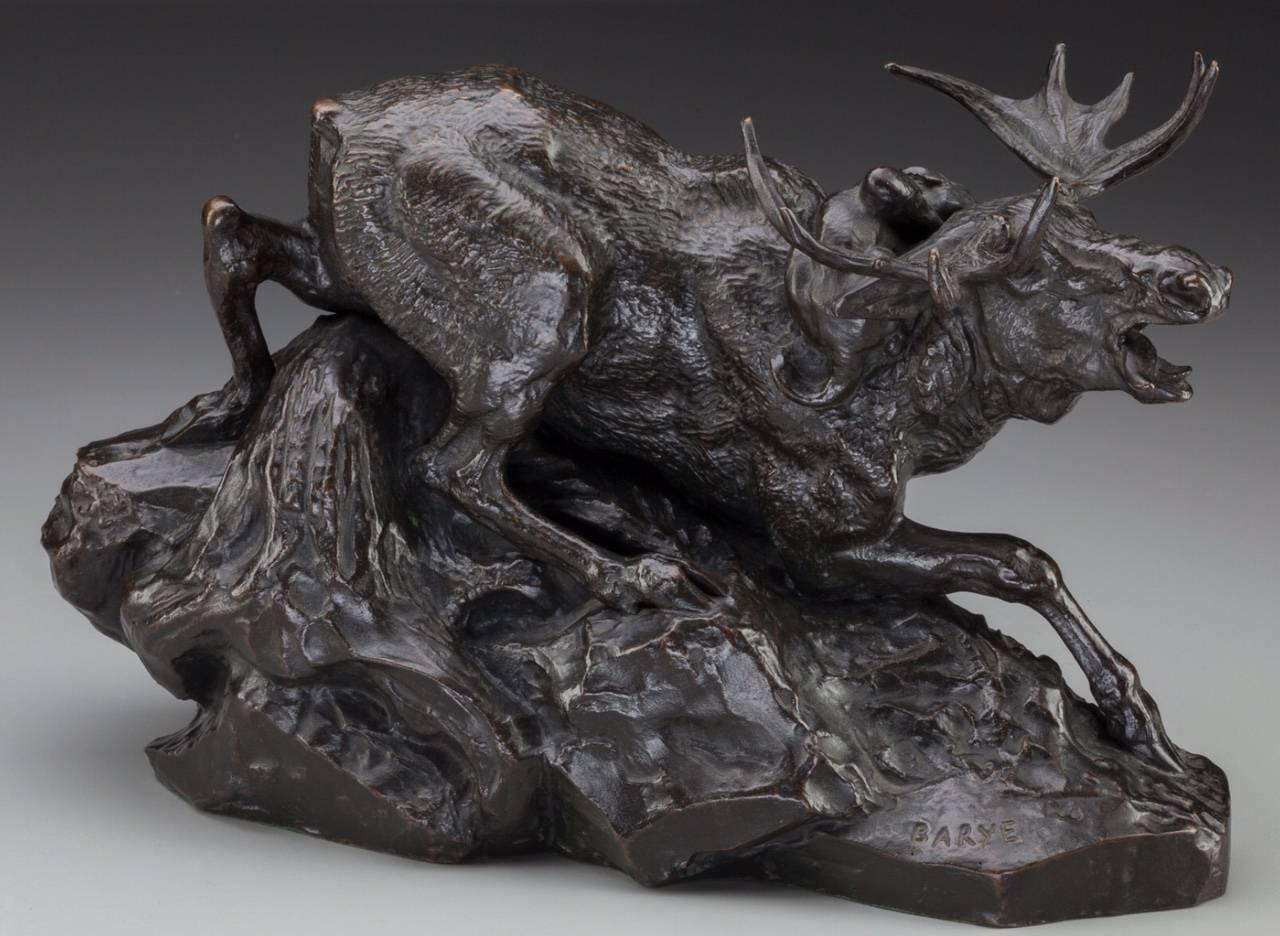
About the Seller
4.9
Gold Seller
Premium sellers maintaining a 4.3+ rating and 24-hour response times
Established in 2000
1stDibs seller since 2015
448 sales on 1stDibs
Typical response time: 2 hours
- ShippingRetrieving quote...Shipping from: Dallas, TX
- Return Policy
Authenticity Guarantee
In the unlikely event there’s an issue with an item’s authenticity, contact us within 1 year for a full refund. DetailsMoney-Back Guarantee
If your item is not as described, is damaged in transit, or does not arrive, contact us within 7 days for a full refund. Details24-Hour Cancellation
You have a 24-hour grace period in which to reconsider your purchase, with no questions asked.Vetted Professional Sellers
Our world-class sellers must adhere to strict standards for service and quality, maintaining the integrity of our listings.Price-Match Guarantee
If you find that a seller listed the same item for a lower price elsewhere, we’ll match it.Trusted Global Delivery
Our best-in-class carrier network provides specialized shipping options worldwide, including custom delivery.More From This Seller
View AllTang Dynasty Painted Pottery Fat lady Sculpture
Located in Dallas, TX
A wonderful period Tang Dynasty Pottery Figure of a Fat Lady.
Tomb Pottery
China
Height: 15 Inches
No TL Test
A COA by Avantiques will accompany the sale of this item.
Condition: Ve...
Category
Antique 15th Century and Earlier Chinese Tang Figurative Sculptures
Materials
Pottery
Tang Dynasty Museum Quality TL Tested Terracotta Fat Lady Figure
Located in Dallas, TX
Tang Dynasty painted terracotta fat lady tomb figure
China. Tang Dynasty Circa 618-907
Modelled in the form of a classically dressed fat lady, this terraco...
Category
Antique 15th Century and Earlier Chinese Tang Figurative Sculptures
Materials
Terracotta
Tang Dynasty Painted Terracotta Sculpture of a Lokapala
By Tang Dynasty
Located in Dallas, TX
Tang Dynasty terracotta Pottery Tomb figure of the Lokapala Warrier Deity. Figure molded wearing heavy armor, standing in a dynamic pose with left arm raised in a threatening gesture...
Category
Antique 15th Century and Earlier Chinese Tang Figurative Sculptures
Materials
Terracotta
Tang Dynasty Pottery Lokapala Tomb Figure
Located in Dallas, TX
A wonderful Chinese red clay pottery tomb figure from the Tang Dynasty (618 to 907). Guarding a dignitary or decorated soldier; these figures stood guard for over a thousand years surviving to decorate your home collection of ancient artistic and cultural artifacts. Original Polychromed red and gray paint pigments still present.
Chinese Buddhist guardian statues made of earthenware and pigments, from the Tang Dynasty (618–907 AD), dated to the late 7th to first half of the 9th century.
The foreign facial features of this brilliantly sculpted guardian figure is evidence of the strong Western presence in Tang-dynasty China. Originating in the Lokapala deity of the Buddhist religion, which came to China from the West, this type of armored tomb guardian...
Category
Antique 15th Century and Earlier Chinese Tang Figurative Sculptures
Materials
Terracotta
Large Han Dynasty Terra-cotta Court Lady Figure TL Tested
Located in Dallas, TX
Huge Han Dynasty Terracotta figure Of A Court Lady. TL Test conducted by Ralf Kotalla Laboratory in Germany. Report included.
Height: 29...
Category
Antique 15th Century and Earlier Chinese Han Figurative Sculptures
Materials
Terracotta
Tang Dynasty Museum Fat Lady and Child TL Tested
Located in Dallas, TX
Tang Dynasty polychromed fat lady with child in arm. TL Tested
Terracotta, pottery with traces of orange and green paint
Sui to Tang Dynasty (581-618)
Measures: Height: 20.2 inches (51cm)
Width: 9.45 inches (24cm)
Guaranteed Authentic with corresponding TL Thermoluminescence Test conducted by Artemis Testing Lab Included in the sale of this item.
Condition: Excellent with loss to pinky and wear commensurate of age.
This rare and outstanding ceramic court attendant was made during what many consider to be China’s Golden Age, the T’ang Dynasty. It was at this point that China’s outstanding technological and aesthetic achievements opened to external influences, resulting in the introduction of numerous new forms of self-expression, coupled with internal innovation and considerable social freedom. The T’ang dynasty also saw the birth of the printed novel, significant musical and theatrical heritage and many of China’s best-known painters and artists. The T’ang Dynasty took control in 618 AD, when the Li family seized power from the last crumbling remnants of the preceding Sui Dynasty. This political and regal regime was long-lived, and lasted for almost 300 years. The imperial aspirations of the preceding periods and early T’ang leaders led to unprecedented wealth, resulting in considerable socioeconomic stability, the development of trade networks and vast urbanisation for China’s exploding population (estimated at around 50 million people in the 8th century AD). The T’ang rulers took cues from earlier periods, maintaining many of their administrative structures and systems intact. Even when dynastic and governmental institutions withdrew from management of the empire towards the end of the period – their authority undermined by localised rebellions and regional governors known as jiedushi –the systems were so well-established that they continued to operate regardless. The artworks created during this era are among China’s greatest cultural achievements. It was the greatest age for Chinese poetry...
Category
Antique 15th Century and Earlier Chinese Tang Figurative Sculptures
Materials
Terracotta
You May Also Like
Chinese Tang Dynasty Pottery Court Lady
Located in Austin, TX
Painted pottery figure of an opulent Chinese court woman with up-swept hair and standing in a simply draped robe from the Tang Dynasty (618-907 AD). Her beauty is illuminated by the ...
Category
Antique 15th Century and Earlier Chinese Tang Antiquities
Materials
Pottery, Acrylic
Tang Style Sancai-Glazed Figure of a Court Lady
Located in Ottawa, Ontario
A Tang style Sancai-glazed
Figure of a Court Lady,
20th century.
Standing figure with
the long amber and green-glazed robe
and green-glazed shoes,
the delicate features ...
Category
20th Century Chinese Chinese Export Figurative Sculptures
Materials
Pottery
Tang Dynasty, Antique Chinese Painted Pottery Fat Lady with Oxford TL Test
Located in Sampantawong, TH
Antique Chinese painted pottery fat lady with original pigments remaining.
Thermoluminescence (TL) test result from Oxford Authentication Ltd. is included.
Age: China, Tang Dynasty,...
Category
Antique 15th Century and Earlier Chinese Antiquities
Materials
Pottery
Decorative Chinese Terracotta Sculpture - Court Lady
Located in Madrid, ES
This elegant Chinese terracotta sculpture, crafted in the 20th century, portrays a graceful court lady, a timeless symbol of refinement and cultural heritage. Its detailed craftsmanship and balanced proportions make it an exquisite addition to any collection or decor setting.
Artistic Highlights:
Material: Made from high-quality terracotta, showcasing detailed artistry.
Design: Features a court lady in traditional Chinese attire, reflecting historical and cultural significance.
Condition:
Excellent overall condition, well-preserved with minimal signs of age.
Dimensions:
Height: 40 cm
Width: 14 cm
Depth: 10 cm
Key Features:
Cultural Representation: Captures the elegance and grace of a Chinese court lady...
Category
Mid-20th Century Figurative Sculptures
Materials
Terracotta
Chinese Unglazed Ceramic Kwanyin Figure
Located in Queens, NY
Chinese molded, unglazed beige ceramic figure depicts the stylized Buddhist Goddess posed in a billowy robe with a painted floral pattern, a peaceful smiling facial expression, her l...
Category
20th Century Chinese Sculptures and Carvings
Materials
Ceramic
China. Terracotta Mingqi of Fat Lady, Tang dynastie, 700-750 AD
Located in UTRECHT, UT
Terracotta figurine depicting a standing court lady with hands folded in front of her chest, hair pinned up and pleated robe.
Intact, with remains of original polychromy.
Height:...
Category
Antique 15th Century and Earlier Chinese Tang Antiquities
Materials
Terracotta
More Ways To Browse
Chinese Lady
Terra Cotta Paintings
Chinese Pottery Figure
Fat Sculptures
Chinese Fat Lady
Fat Lady Sculpture
Antique Angel Wings
Antique French Horns
Antique Jester
Antique Saint Statues
Auguste Moreau Bronze
Carved Wood Saint
Cupid Figure
Goldscheider Figurine
Lady Figurines
Medieval Knight
Oriental Sculpture
Putti Angels
